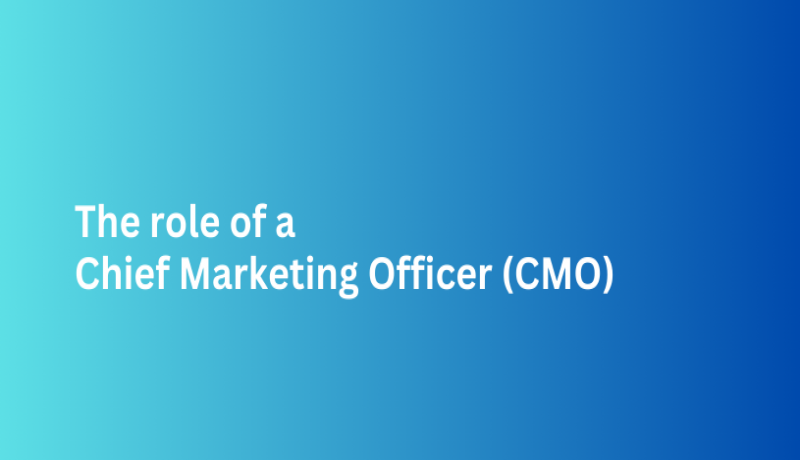The role of a Chief Marketing Officer (CMO)
The role of a Chief Marketing Officer (CMO) in an organization is crucial for developing and implementing marketing strategies to drive business growth and brand awareness. The specific roles and responsibilities of a CMO may vary depending on the organization's size, industry, and structure, but here are some common functions associated with the position:
1. Developing Marketing Strategies: The CMO is responsible for creating and implementing comprehensive marketing strategies aligned with the company's overall goals. These strategies encompass various marketing channels, such as digital, traditional, social media, and content marketing.
2. Brand Management: The CMO oversees the company's brand image and ensures consistent messaging and branding across all marketing materials and campaigns. This includes maintaining brand guidelines and ensuring brand integrity.
3. Drive Revenue: CMOs ensure an adequate ROI on marketing efforts be it just branding or targeted approach to customers. CMO is a cost center trying to channel all their efforts to make the company itself a profit center.
4. Market Research and Analysis: CMOs are often responsible for market research to understand customer needs, market trends, and competitor actions. They use this information to make informed decisions and adjust strategies accordingly.
5. Customer Acquisition and Retention: CMOs are responsible for acquiring new customers and retaining existing ones. This involves lead generation, customer segmentation, and implementing customer retention strategies like loyalty programs.
6. Product and Service Promotion: The CMO is responsible for promoting the company's products or services effectively. This includes designing marketing campaigns, developing pricing strategies, and creating compelling advertising and promotional materials.
7. Digital Marketing: With the increasing importance of digital channels, CMOs often manage digital marketing efforts, including SEO, social media marketing, email marketing, and online advertising campaigns.
8. Marketing Team Leadership: CMOs lead and manage the marketing department, overseeing a team of marketing professionals and ensuring their productivity and alignment with the organization's goals.
9. Budget Management: CMOs are typically responsible for managing the marketing budget, allocating resources effectively, and measuring the return on investment (ROI) for marketing campaigns.
10. Analytics and Performance Measurement: They use data and analytics to evaluate the performance of marketing campaigns and strategies. Key performance indicators (KPIs) are monitored to assess the effectiveness of marketing efforts.
11. Partnerships and Alliances: CMOs may establish and maintain partnerships or alliances with other businesses or organizations to expand reach and leverage shared resources.
12. Public Relations: Some CMOs are responsible for managing public relations efforts, including handling media relations, press releases, and crisis communications.
13. Innovation: Staying up-to-date with emerging marketing trends, tools, and technologies is crucial. CMOs often need to identify and implement innovative marketing techniques to gain a competitive edge.
14. Compliance and Legal Considerations: Ensuring marketing efforts comply with relevant laws and regulations is essential to avoid legal issues.
15. Executive Leadership: As part of the executive team, CMOs collaborate with other C-suite executives, such as the CEO and CFO, to align marketing strategies with the overall business strategy.
16. Reporting and Communication: CMOs often report to the CEO or board of directors, providing regular updates on marketing performance and strategies.
The CMO plays a pivotal role in shaping the company's market position, driving revenue growth, and building brand reputation. The exact responsibilities may vary from one organization to another, but these functions provide a general overview of what a CMO typically handles.
Your Resume Needs an Upgrade!
If you are a senior executive, then your resume probably needs an upgrade. In your journey to the top, you understand the importance of making a strong first impression. Your resume is often your first impression, and it needs to convey your unique value and experience effectively.
Our Executive Resume Writing Service is designed for leaders like you, who are aiming to elevate their careers to new heights. Upgrade with professional experts to industry recognized formats, fonts, text, content and pleasing design.
Whether you're pursuing a new career opportunity, seeking a promotion, or aiming for a more rewarding role, we are here to help you achieve your goals.
Get started - https://executiveresumewriting.c-suitecvsecure.com/








